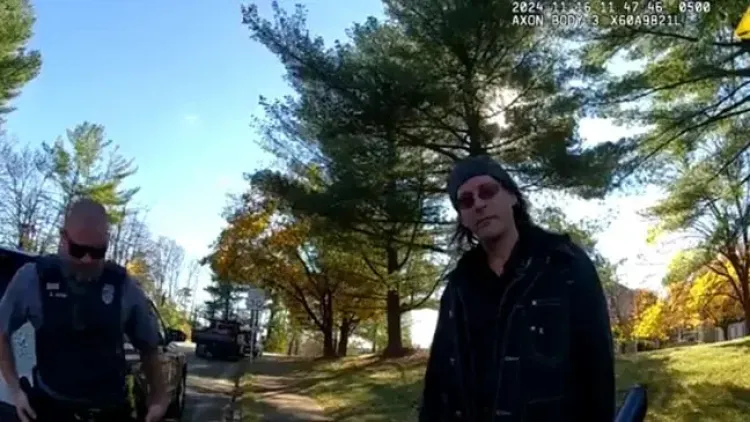The Disturbing Case of Richard Cox: A Registered Sex Offender's Alleged Exploitation of Public Facilities in Virginia
In the suburbs of Northern Virginia, a series of troubling incidents has highlighted tensions between transgender access policies, public safety, and criminal justice. At the heart of the story is Richard Kenneth Cox, a 58-year-old Tier III registered sex offender with a long criminal history. Cox allegedly exposed himself in women's locker rooms at local schools and recreation centers while identifying as transgender, allowing him access under local policies. Adding to the gravity, authorities found child pornography on his phone, along with schedules for girls' swim classes at Fairfax County rec centers, pointing to a possible targeted effort to approach areas with children. This case raises important questions about balancing inclusivity with protecting vulnerable groups, sparking debates and calls for policy changes.
Cox's Criminal Background: A Long Pattern of Offenses
Richard Cox's record as a sex offender stretches back to the late 1980s. As a Tier III offender—the highest risk category in Virginia, requiring lifetime registration—he has multiple convictions involving children. His history includes prison time from 1988 to 2018 for offenses like indecent liberties with minors. In 1992, he was convicted for exposing himself to children in a gymnasium, showing an early tendency to target child-focused spaces. By 2020, he was wanted for violating probation and failing to register as a sex offender, with restrictions barring him from places like schools, parks, and playgrounds.
In recent years, Cox has identified as transgender, which has been central to how he gained entry to women's facilities under non-discrimination rules in Arlington and Fairfax counties.
Timeline of Recent Incidents: From Entry to Exposure
The events in late 2024 unfolded across public pools and locker rooms in Arlington and Fairfax counties, often during or after children's activities. Here's a chronological overview in table form for clarity:
| Date | Location | Details | Outcome |
|---|---|---|---|
| June 2024 | Fairfax County Planet Fitness (two locations) | Cox used women's locker rooms, claiming to be a woman; one indecent exposure charge arose but was later dismissed, with Cox arguing nudity in locker rooms isn't indecent. | Charge dismissed; no further action. |
| September 2024 | Washington Liberty High School, Arlington | Cox allegedly exposed himself in the girls' locker room after swim lessons, seen by a mother and her 9-year-old daughter. Policies allow use based on gender identity. | Charges filed for indecent exposure and loitering near child facilities. |
| October-November 2024 | Wakefield High School, Arlington | Multiple exposures reported in the women's locker room. | Additional charges added. |
| November 2024 (twice) | Oakmont Rec Center, Fairfax County | Cox accessed the women's locker room; complaints on November 3 led to issues, and on November 16, he was aggressive with staff. | No-trespass notice issued for all Fairfax rec centers; no criminal charges. |
| December 2, 2024 | Barcroft Sports and Fitness Center, Arlington | Cox allegedly exposed himself in the women's locker room near an adult and two juveniles. | Arrested on December 6 for indecent exposure, sex offender loitering, and identity theft. |
These occurrences frequently happened around kids' swim classes, heightening fears for child safety. Witnesses described Cox standing naked in showers, touching himself, or sitting exposed on benches, encounters that affected women and girls as young as five.
Key Evidence: Child Pornography and Signs of Targeting
During an investigation in Arlington, police examined Cox's phone and discovered child pornography. They also found detailed schedules for children's gymnastics at Barcroft and swim lessons at Fairfax rec centers. Prosecutors suggested this showed a deliberate plan to visit spots with children for sexual purposes. Additional video evidence captured Cox entering women's locker rooms and lingering near child areas like spray parks and playgrounds in Fairfax.
This evidence has been called alarming, directly tying into concerns about how policies enabled his access without initial scrutiny.
Legal Proceedings: Differences Across Counties
In Arlington, Cox faces over 20 charges, including indecent exposure, violating sex offender rules, and identity theft for giving false details during arrests. A detailed preliminary hearing included testimony from witnesses like a 17-year-old lifeguard and affected women. Cox requested female pronouns in court, but the judge denied it. He's scheduled for a Grand Jury, with a court date in March 2025, and police are seeking more victims.
In contrast, Fairfax County hasn't filed charges despite similar reports and the phone evidence. The local prosecutor's office concluded there wasn't enough probable cause, a decision that's faced criticism for potential leniency.
Responses from Officials and Push for Reforms
Virginia's Attorney General, Jason Miyares, has strongly criticized Fairfax's approach, arguing that failing to prosecute allowed further incidents in Arlington. He described Cox's behavior as deliberate and systemic, aimed at children for gratification, and pointed to Cox's use of a state-issued ID to enter facilities near childcare areas in violation of probation. Miyares is pushing for new laws to let his office handle sex crime cases declined locally.
Local leaders, like Fairfax Supervisor Pat Herrity, have echoed these concerns, stating that the county's transgender policy enabled the incidents and that biological males shouldn't access girls' and women's locker rooms.
Wider Implications: Debates on Policy and Safety
This case has fueled broader discussions on transgender policies in public spaces. Supporters argue these rules prevent discrimination, while critics worry they can be abused by individuals like Cox. Both counties' policies base access on gender identity, which initially allowed Cox entry.
The disparity in charges between counties highlights issues with prosecutorial choices and resources for sex crimes. As the case progresses, it could lead to stronger safeguards, like better access verification or required reporting, to protect rights while ensuring safety.
Overall, Richard Cox's story reveals gaps in public systems, rooted in his history and amplified by policy loopholes. With legal actions ongoing and political attention growing, it may drive changes in Virginia and elsewhere.
